Fools in the Hotzone: Saruman as the Bold but Incompetent Firefighter
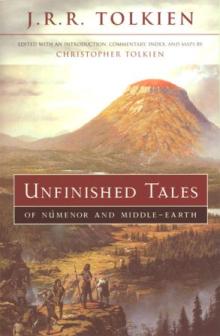 Every year the Man sends me to Hazardous Waste Operations and Emergency Response class. These HAZWOPER classes are almost always taught by firefighters because they routinely deal with emergency responses to hazardous materials.
Every year the Man sends me to Hazardous Waste Operations and Emergency Response class. These HAZWOPER classes are almost always taught by firefighters because they routinely deal with emergency responses to hazardous materials.
Over the years, I’ve noticed a trend in the way they teach the course — that most of the examples of what not to do when knee-deep in an emergency dealing with hazardous materials comes from the hard lessons of other firefighters. More specifically, they come from the gung-ho firefighters who charge into a dangerous situation, make said situation worse, and other firefighters have to spend time and energy rescuing them instead of dealing with the main problem.
Because I’m a nerd, and I’ve taken this class a lot over the years and my mind wanders, I immediately saw a parallel to the wizards of JRR Tolkien’s Middle-Earth.
Background? Surely:
So at the end of the Second Age, Sauron has completely corrupted the men of Númenor, causing their destruction and his own. Because you can’t keep a good Miaiar down, and especially an extremely bad one like Sauron, he’ll be back. Which is why the Valar of the Utermost West decided to select three of their number to go to middle earth and “deal” with the problem of Sauron’s inevitable return.
From The Return of the King:
They came therefore in the shape of Men, though they were never young and aged only slowly, and they had many powers of mind and hand. The two highest of this order (of whom it is said there were five) were called by the Eldar (elves) Curunir ‘the Man of Skill’, and Mithrandir, ‘the Grey Pilgrim’, but by Men in the North Saruman and Gandalf.
Notice how the original number of three swelled to five? That’s what happens when divine beings make decisions by committee. However, the details of those proceedings are important — nay crucial — in understanding Saruman’s supreme arrogance and the depth of his magnificent solution to the Sauron problem.
‘Who would go? For they must be mighty, peers of Sauron, but must forgo might, and clothe themselves in flesh so as to treat on equality and win the trust of Elves and Men. But this would imperil them, dimming their wisdom and knowledge, and confusing them with fears, cares, and weariness coming from the flesh.’ But two only came forward: Curumo (Saruman), who was chosen by Aulë, and Alatar, who was sent by Oromë.
It is important to note that when the word went out for volunteers, Saruman is listed first among the only two that answered. And how does Gandalf get into the mix?
Also from Unfinished Tales:
Then Manwë asked, where was Olórin (Gandalf)? and Olórin, who was clad in grey, and having just entered from a journey had seated himself at the edge of the council, asked what Manwë would have of him. Manwë replied that he wished Olorin to go as the third messenger to Middle-earth. But Olorin declared that he was too weak for such a task, and that he feared Sauron. Then Manwë said that was all the more reason why he should go, and that he commended Olórin [to go as the third messenger]. But at that Varda looked up and said: ‘Not as the third” and Curumo remembered it.
So here you’ve got your three. Saruman being “chosen”, Alatar being “sent”, and Gandalf having to be “ordered.”
Of course, agendas are crucial to conducting any staff meeting, and all agendas fall apart once the meeting starts.
From Unfinished Tales:
Curumo (Saruman) took Aiwendil (Radagast) because Yavanna begged him, and that Alatar took Pallando as a friend.
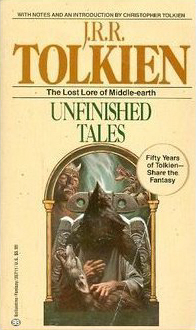 Here’s the history that is so interesting to me. Saruman’s boss is Aulë — the god of rocks and metal, he’s kind of a “forge” god. A god concerned with the making of things. And in the creation of the world, Saruman’s co-worker under Aulë is — Sauron.
Here’s the history that is so interesting to me. Saruman’s boss is Aulë — the god of rocks and metal, he’s kind of a “forge” god. A god concerned with the making of things. And in the creation of the world, Saruman’s co-worker under Aulë is — Sauron.
It is interesting that after getting slapped down as “leader” of the group by Varda, Saruman is still the one that Yavanna (the goddess of all “growing things”) goes to ensure that a representative of her interests is among the wizards. She doesn’t bring this up at the council; she takes it to him personally. Also, she’s Aulë’s wife, so Saruman’s first official call as a wizard is to do a favor for his boss’s wife. Just in case you think the gods are not as petty and repetitive as us poor mortals, I have to point out that Yavanna’s pleading omits the fact she already has an entire race of her own agents in Middle-earth: the Ents.
And, of course, no task involving destroying an indestructible evil force would be complete without tying your hands behind your back:
From Unfinished Tales:
Whereas now their emissaries were forbidden to reveal themselves in forms of majesty, or to seek to rule the wills of Men or Elves by open display of power, but coming shapes weak and humble were bidden to advise and persuade Men and Elves to good, and to seek to unite in love and understanding all those whom Sauron, should he come again, would endeavor to dominate and corrupt.
The more you know about Saruman, the more sympathetic to his situation you become. He is the first picked to go, and the first to arrive in Middle-earth. He journeys to the east with Aratar and Pollombo, and those two don’t return (not much is said about the blue wizards, but honestly I get the feeling they kind of flake out altogether — a very real danger with volunteers who get to bring their friends along).
But Saruman’s always second fiddle. Right from the start Varda makes it clear that he’s not in charge, and later when the White Council is formed, Galadriel doesn’t want him in control of that august body either. And he learns that that weenie Gandalf (who comes to Middle-earth one hundred years later) gets one of the three rings of power the day he freaking lands. Ugh! The humiliation! You’d retreat to the fastness of your ancient tower, too.
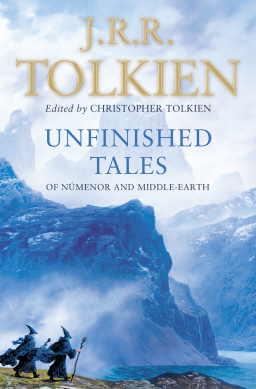 Saruman’s activities are not well defined, but there are hints that he tangles with ring wraiths, and he is in the thick of it when the White Council goes to Dol Guldur to deal with the Necromancer. After Dol Guldur, he withdraws a bit, but even then he is still working on the Sauron problem, and his solution is as awful as it is cunning. You have to keep in mind, he’s come to Middle-earth, he fights the good fight (for over a thousand years), stress causes his hair to turn from black to white, he gets the keys to Orthanc, and he discovers the palantir. And after Dol Guldur is where the Big Plan starts.
Saruman’s activities are not well defined, but there are hints that he tangles with ring wraiths, and he is in the thick of it when the White Council goes to Dol Guldur to deal with the Necromancer. After Dol Guldur, he withdraws a bit, but even then he is still working on the Sauron problem, and his solution is as awful as it is cunning. You have to keep in mind, he’s come to Middle-earth, he fights the good fight (for over a thousand years), stress causes his hair to turn from black to white, he gets the keys to Orthanc, and he discovers the palantir. And after Dol Guldur is where the Big Plan starts.
And here is the tragedy of it all, as Sauron and Saruman were co-workers back in the day, they have a remarkably similar ‘corporate culture’, and a pretty similar worldview — and this is why the wise don’t really want Saruman in charge — because his answer to Sauron will be to become Sauron, Ring or no.
Sauron, of course, knows all this, and that’s why it is so easy for him, via the palantir, to pluck at Saruman’s pride and ensure that, like the gung-ho fireman, he overestimates his own abilities and underestimates the situation, and his teammates have to burn valuable time and resources bailing him out.
And since Saruman can’t force Men or Elves to fight his Big War, he comes up with the idea of the half-orcs/Urik-hai. The injunction by the gods? Doesn’t say shit about orcs, does it? Hell no it doesn’t! So, really, it was only a matter of time before Saruman realized that he could raise an army of his own orcs to take on Sauron’s. Give him another hundred years and he won’t need the damn Men or the Elves. It really has a whole Stalin vs. Hitler vibe, doesn’t it?
And I want to point out that the only orcs who get anywhere close to success in this entire trilogy are Saruman’s orcs. Love the Uruk-Hai or hate ’em, it goes down exactly like Uglúk said it would. In fact, had Ugluk not been saddled with the goblins of Moria and up to his watery eyes in spies from Mordor, I daresay Saruman of many colors would have totally shaken the pillars of heaven.
But what’s odd is that Saruman double-hedges his bets, even once he begins constructing his army, he’s obeying the letter, but not the spirit, of the law; he doesn’t use any of his mojo on Theoden… maybe he taught Grima a little mojo and let him do it, but well, he doesn’t even make Grima do anything.
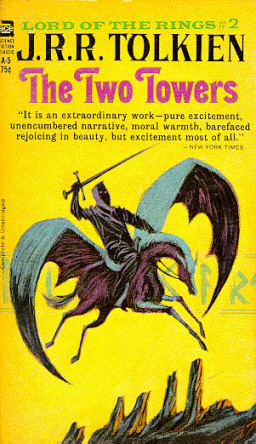 And, if you read the The Two Towers, even Saruman does not order his Uruk-hai to do anything (in the various movies Saruman is shown ordering them out, but in the book this is never shown). And it is a good thing, too, because had those orcs had even the slightest bit of decent leadership, they wouldn’t have rushed up to the walls of Helms Deep with no plan (other than to mill around getting killed). Like DEVO, I must repeat: Saruman doesn’t even really bend the will of the Uruk-hai to his own.
And, if you read the The Two Towers, even Saruman does not order his Uruk-hai to do anything (in the various movies Saruman is shown ordering them out, but in the book this is never shown). And it is a good thing, too, because had those orcs had even the slightest bit of decent leadership, they wouldn’t have rushed up to the walls of Helms Deep with no plan (other than to mill around getting killed). Like DEVO, I must repeat: Saruman doesn’t even really bend the will of the Uruk-hai to his own.
I realize that there may be some readers who think me a fool to state that Saruman was not in charge, but I think the evidence speaks for itself. And, during the storming of Minas Tirith, Tolkien mentions on multiple occasions that “no brigand or orc-chieftain was in charge” but that the chief of the Nazgúl was. And I think it also hints strongly that the Uruk-hai were left on their own (along with their far-from-competent human allies).
The injunction does not mention Hobbits, and that too, is key, perhaps the key to the end of the trilogy. Saruman didn’t have time to build a big enough army of half-orcs to stand against Sauron, so Plan A is shot all to hell, and he didn’t get his hands on the Ring, so there goes Plan B, and thanks to the remarkable willpower of those scruffy Hobbits, he can’t take refuge under Sauron’s massive cloak (where I feel confident that Saruman would have convinced himself that he’d affect long-term change from within the organization). His pride– something that is a key part of his very being is stung — so what does he do? Well, he goes and screws with the Hobbits because he can. Because there is no one else for him to take revenge on. In a creepy way he still won’t turn a hand against Men or Elves, and the Ents have already handed him his ass (and, well, Radagast might be a harder opponent than Saruman’s tough talk implies).
I have no idea what Saruman is thinking in taking over the Shire, yes he is spiteful, he is vengeful-minded, but again he has totally not turned completely from his path. He doesn’t, as far as I know, do anything to the Hobbits himself, even to Frodo. So what the heck is he doing in the Shire? What is his long-term plan? Plan D, I think, is that the new age is just starting, and that if you give him another century (and what is a century to Saruman?), he will build a great thing, a great kingdom, the Elves and the Men will have to deal with Saruman, one way or another.
Back to the firefighter analogy: just as the incompetent firefighter gets himself into trouble and diverts energy and materials away from the fire itself, so does Saruman. In his misguided attempts to solve the problem, he ends up making things worse, and not only does Rohan have to expend a lot of men and energy dealing with that, but so does Gandalf. Gandalf stands up for Saruman, and that is puzzling to many people, and it smacks of an old-boy network, but Gandalf knows that Saruman has done his job, and done it well, for thousands of years, and even after getting totally juked by Sauron (which is what Sauron does) and was in a strange way doing it even with the search for the Ring and the Uruk-hai.
Gandalf’s answer to the Saruman problem? In a delicious way, in a very Saruman-like way, that isn’t Gandalf’s f-ing problem is it? That’s not what he’s been sent to Middle-earth to deal with. In the end, everyone, Gandalf, Saruman, Hobbits, Grima, they are all given free reign over their own fates.
This essay originally appeared in 2011 at the Home of Heroics on the Rogue Blades Entertainment website.
Adrian Simmons is an editor for Heroic Fantasy Quarterly. His next article for us was Frodo Baggins, Lady Galadriel, and the Games of the Mighty.
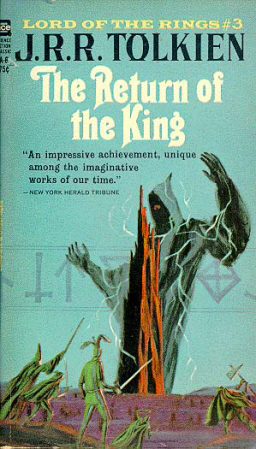
Very interesting. Good post.
What a great post! I just finished a 40 hour HAZWOPER course. I’m also a huge lord of the rings fan. The metaphor might be slightly stretched but you do a good job in getting your point across.
This is the best explanation I’ve found about the 5 wizards
I’m so glad this piece has a new life on Black Gate. I hadn’t seen it before, and it’s a great analysis of Saruman.
I always had a theory about Radagast, Alatar, and Pallando. As worried as the Valar are about Sauron’s shenanigans, what really keeps them up at night is the certainty that Morgoth is eventually going to break through the firmament and come back, and then everybody in Middle Earth will have to face the Dagor Dagorath, the battle of battles. So the Valar send five Maiar–two to take down Sauron, so that Morgoth won’t come back to an army of allies ready to roll over the Men and Elves, and three to lay the groundwork for defeating Morgoth, who is one of the Valar and therefore much more badass than Sauron. Sauron commanded orcs; Morgoth invented them.
So the three Maiar who are lying in wait for Morgoth when he returns are working exactly where Morgoth and Sauron don’t see enough power to bother messing around: with the animals (Orome’s people) and the plants (Yavanna’s people). And if I were Alatar, preparing to face Morgoth himself, I’d want my best friend at my back. Maybe not enough to ask my best friend to put himself in that kind of danger with me, but I’d wish for it. Pallando leaves Valinor and spends thousands of years as a sleeper agent, fully expecting to face the wrath of Morgoth, not because his bosses the Valar tell him to, but because his friend asks him to. Pallando may be the noblest of the five.
Thanks all! This essay is one of my favorites.
Glenn, you are right, the firefighter metaphor is a little streteched, but it fits. And I bet you saw the same videos of firefighters making mistakes in your HAZWOPR that I did.
Sarah, you have an interesting hypothesis, but I thought that Melkor was destroyed in a permanent fashion at some point. Maybe I’m remembering wrong, but that’s what I recall.
As an inveterate Uruk sympathizer I really enjoyed this, lot’s I’d never even considered. Time for a reread!
[…] Unfinished Tales, J.R.R. Tolkien ($26) […]
[…] Adrian Simmons delves deep into Tolkien’s Unfinished Tales to identify Saruman’s actual mission in Middle Earth and then attempts to put the white wizard’s motives, policies, and machinations into proper perspective. […]
[…] interesting explanation of Saruman. I thought it was a fun […]
[…] discuss this at length in another essay, but due to their shared background it is almost inevitable that Saruman’s answer to the Sauron […]
[…] Also on the Top Five was Adrian Simmons, with another look at subtle storytelling of J.R.R. Tolkien, “Frodo Baggins, Lady Galadriel, and the Games of the Mighty,” a follow up to his popular article “Fools in the Hotzone: Saruman as the Bold but Incompetent Firefighter.” […]